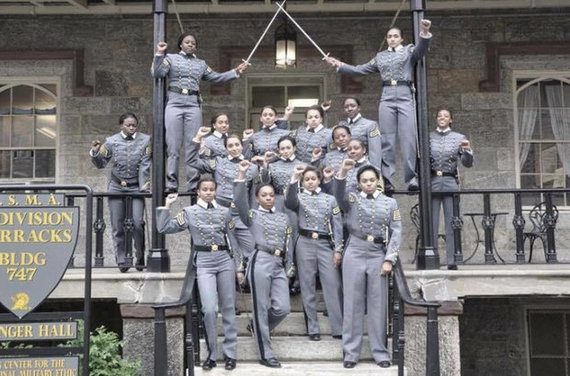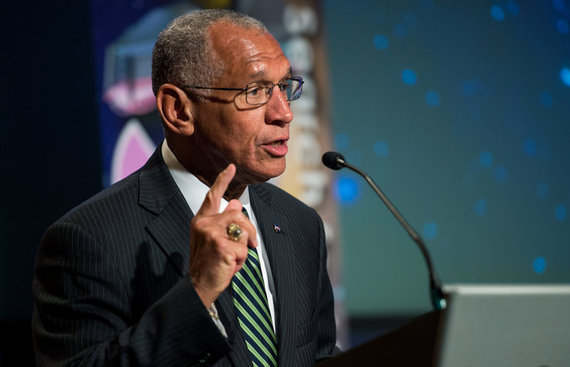Last week the United States Military Academy at West Point launched an inquiry into the conduct of 16 African-American Women Cadets for posing in a picture commonly referred to as an "Old Corps" photo. The inquiry was generated under the suspicion that the cadets were somehow making a "political statement" with their raised fists, an act that allegedly violated Department of Defense (DOD) regulations on political activities for military members.
The ground that this inquiry stands upon is shaky at best, and borderline nefarious. If the Department of Defense (DOD) was remotely interested in curbing the political activities of its military members, the taxpayers would be better served by first looking to the DOD bureaucracy, often found wandering the halls of Congress pursuing political agendas that align with their insatiable appetite for weaponry. What's more telling is that the "PC" police, who often rush to the defense of our troops on issues such as display of the confederate flag, have remained remarkably silent in the conversation. For most minority women and other underrepresented communities who've served in the military, the absence of support is chilling, but not surprising. In fact, for many underrepresented communities, signals such as this point to presence of one thing.
Bigotry.
For the cadets, the institutional overreaction to their photo is even less surprising. This year, West Point is graduating only 16 African-American women (that's about 1.7%) in a class of about 1000 from one of the toughest programs in the world. I recently spoke to a female African-American service academy graduate who offered an important perspective. Speaking under anonymity, the officer stated, "Back when I attended the Air Force Academy, we graduated just seven African-American women, just seven. Currently, I'm the only one in my class that is left on active duty." Why did she choose to remain anonymous? It's simple, if she hadn't, she'd be facing the same scrutiny the West Point Cadets are facing.
With those kinds of graduation numbers, one might imagine cause for a celebratory photo of unity. After all, graduating as a woman, much less a minority woman, from a male dominated service academy is no small feat. What's worse, the message sent by the institution is chilling to the bone, and all too familiar for young minorities who are attending and excelling in the military. The message is plain as can be--try to act like you are part of "The Old Corps," and the institution is going to come after you. Yet in many ways, their act is painting a picture that is deeper and far more profound. Ultimately, their picture is less about honoring the women who made it, and more about honoring the ones that didn't.
As a former graduate of a service academy, their world is reminiscent of my own experiences. During my senior year, upon selection for a senior cadet command position, I had a peer pull me aside for some coaching: "You know, my brother went to West Point, and out there people that look like you are called Sand N_ _ _ _ _."
In retrospect, what my peer was telling me was that he wanted me to play in a different box that than the one I had meritoriously achieved, a box founded on oppression. Of course, the very same box dates back to our founders, who built sound moral principles, yet principles intended primarily for leaders that looked like themselves. By using a racial epithet my colleague created the only world he could fathom in his mind, primarily because the other one filled him with fear.
The sad part is that this experience is not an anomaly.
In a recent interview with NPR, NASA Administrator Charles Bolden, a former two-star General and Naval Academy graduate recently said that his dream of attending the Naval Academy almost didn't happen. He continued by stating that his Congressmen would not nominate him for consideration because he was black. One of South Carolina's senators at the time, Strom Thurmond, flatly rejected Bolden's request.
In his NPR interview, Bolden said, "He told me, no way are you going to get an appointment from me to go to the Naval Academy." Bolden continued, "It was clear why they were not supporting me and it was because of the times. They were just not about to appoint a black to the Naval Academy or to any Academy."
With this backdrop, the undercurrents behind the West Point photo reveal more than a simplistic comparison to the "Black Lives Matter" movement. Once again, when you take another look at the depth of the picture and the determination in the cadets' eyes, the photo becomes less about honoring themselves for making it through the academy, and more about honoring their fellow classmates that didn't.
The Meaning of Courage
In my opinion, these are the leaders that we need guarding the freedoms and values we take for granted every day. Brash and unwavering in their spirit, their picture is reminiscent of the Tuskegee Airmen--individuals who, when faced with unspeakable oppression, raised their proverbial fists by painting their aircraft tails bright red in defiance of the box that they were placed in by their leaders. Like our West Point Cadets, they refused to be placed in a box, and ensured they were counted. Years ago, I had the chance to ask a Tuskegee Airman, how did you make it through such unspeakable bigotry? He answered, "Simple...we woke up each day with a brash, almost arrogant approach to flying, sometimes bordering on defiance. We simply had no other choice but to fight for what was right."
That's who the cadets in the picture remind me of--authentic leaders with a message, and ready to deliver for our nation with passion and conviction. These are leaders that will guide the future of our nation, not by being colorblind; rather, by being colorful.
It is important to note that the reaction to their inspiring photo bears a striking similarity to my own experience with one small difference. During my tenure at the academy, individuals often got away with blatant discriminatory comments. Since then, the Military Equal Opportunity (or MEO) program has done a commendable job of stemming acts of blatant discrimination.
However, as one might guess, the resiliency of discriminatory behavior often gives way to administrative pathways that inflict damage on minorities. To put it bluntly, bigotry finds a way. Unfortunately, under the current MEO system, the kind of transformational unity shown by the cadets often exacts a costly price. Without a change in policy, leaders like the Tuskegee Airmen and the West Point Cadets will continue to face backlash. Due to a constrictive climate and outdated MEO system many minorities will never rise meritoriously to the ranks that correspond to their leadership abilities--mostly due to an ongoing climate of fear and intimidation.
How Bigotry "Finds a Way" in the U.S. Military; and What Can Be Done About it
It's a simple truth that for underrepresented minorities who serve, nefarious inquiries are a familiar tactic in a powerful playbook used by those wishing to discriminate. Documentation of small deficiencies, or administrative discipline under the Uniformed Code of Military Justice (or UCMJ) can have dire consequences for future promotion opportunities. The reality is that by carrying documentation of disciplinary action in their permanent record, most officers will find it difficult to make it beyond the rank of lieutenant.
Today, events such as the frivolous inquiry at West Point occur all too often in the military environment. The reality is that minorities who choose to be authentic and bold quickly find themselves under duress, then gone. The techniques rarely take the form of blatant racial epithets, burning crosses, or other obvious forms of bigotry. While overt acts of discrimination occur, bigots wishing to impose lasting damage on their victims have learned to adapt and exploit an anemic and outdated MEO system. With a policy that exempts investigators from considering disparate treatment, an important facet of most civilian equal opportunity programs, complaints go unsubstantiated. Furthermore, MEO and Inspector General cases fall under the same chain of command. This internal conflict-of-interest is fed by a kind of cronyism that nourishes discrimination and increases the potential for reprisal against complainants.
For those choosing to utilize the MEO system, retaliation, intimidation and reprisal await them. Equal opportunity investigators, consisting of the most junior ranks, regularly dismiss even the most egregious cases of discrimination under extreme pressure created by their chain of command. The results are catastrophic, and culminate in the bullying practice of "silencing" whereby the victim is isolated and ignored within their unit. Members wishing to assist the victim feel the immense weight of moral turpitude on their shoulders and are unable to act for fear of the tormentor's wrath. Not even our most senior minority generals are immune from this climate. In a world of intense competition for leadership positions, to act in contrary to the prevailing winds would mean forfeiting the one chance for a minority to break a glass ceiling. In an interview with the Air Force Times, retired four-star General, Larry Spencer, stated that unconscious bias and pressures limit minority officers' ability to get ahead. Spencer said that when he was a colonel, a two-star general asked him what he wanted his next assignment to be. Spencer asked to be the military assistant to the next Secretary of the Air Force. However, because the potential top candidate for Secretary was black, the two-star told him that wouldn't work (interestingly, the African-American Secretary was never selected).
That's reality.
In April of 2015, Captain Gary Bhatti, an Asian American soldier serving at Fort Bragg reported that he was described as having a "likeness of ISIS" in front of his peers by his managing director. Such a humiliating verbal assault on a soldier is hard enough to fathom, let alone the fact that his chain of command concluded that he made the story up. In 2014, the Department's first-ever Hindu Chaplain was forced to retire amidst a barrage of bigotry and hazing from her evangelical chain of command. Both were victims of "silencing", and were subjected to a culture of fear and intimidation that exhausted them to their breaking point.
A little over a decade after the Civil War, Major General John M. Schofield addressed the graduating class at West Point and stated the following:
"The discipline which makes the soldiers of a free country reliable in battle is not to be gained by harsh or tyrannical treatment. On the contrary, such treatment is far more likely to destroy, than to build an army."
West Point would do well to heed the wisdom imparted by General Schofield, and act upon the virtue of their Long Grey Line. The USMA is charged with recruiting and developing leaders much the same way that professional sports do. Except in the business of our national security, it is an endeavor that we dare not come in second place. With this in mind, I hope that DOD takes a hard look at their bureaucracy and ensures that it does not unnecessarily rob our nation of the bold leaders it claims to develop. The brave women pictured above, brash and boundless by their birthright, have shown the courage to stand together and meet the West Point challenge. They believe that courage, and most importantly E' Pluribus Unum is formidable enough to topple the forces of tyranny and preserve our way of life, just as our founders did.
We should carry the same spirit, raise our fists, and support them. But most importantly, we should support the ones who follow them, with real policy reforms that close the loopholes for discrimination in all of its forms.
Ravi Chaudhary is a retired Air Force Officer, Pentagon strategist, pilot, and former recruiting commander. The opinions expressed in this article are the author's own and do not reflect the view or an official position of the United States Government.


